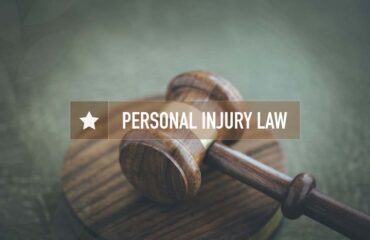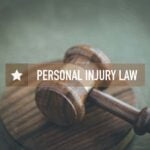My Vehicle Collision was caused by Road Debris. Who is Liable?

One of the reasons few people talk about vehicle collisions caused by road debris is because less than 2% of all motor vehicle crashes are attributed to them. It is easy to ignore the severity and the ramifications of these crashes until you experience this firsthand.
The biggest problem with vehicle collisions caused by road debris is that unlike other types of crashes, it is extremely complicated to establish liability. Most government agencies enjoy indemnity to a very large extent when it comes to such claims.
This does not change the fact that every year nearly 40,000 motor vehicle collisions are caused by road debris across the country. Property damage is suffered in the bulk of these crashes but over 9,000 injuries and 1,235 deaths result from such collisions.
Collisions and road debris
Tire treads of large trucks, mattresses, loose stones in potholes and more, roads are littered with all kinds of trash, and all of these can turn travel along a straight road into a crash.
Road debris related vehicle collisions are not just restricted to a specific driver age group. It can be safely concluded that regardless of driving expertise, you are at risk of being in a vehicle collision when faced with objects on the road.
It cannot be denied that road debris can test new drivers to their limits and pose greater danger to them than to experienced motorists. Moreover, debris can significantly increase the risk of other collision factors, be it distraction, vehicle problems, influence of intoxicants or visibility issues and weather conditions.
How should motorists deal with road debris?
When drivers find themselves seconds away from contact with an object/obstacle on the road, the reflexive reaction is to avoid the object and there are only two ways to do this:
1. Stop before the vehicle hits the object: Most motorists will slam on the brakes to avoid hitting the object because that is how you would react if another vehicle were standing in your way. Unfortunately, depending on the speed of your vehicle and the road and weather conditions, sudden braking can cause you to lose control of the car.
Even if you are not going particularly fast, you could still end up in a rear end collision, based on the speed of the vehicle that is following you and the forward distance maintained by the motorist behind you. If you are lucky, you may escape with a badly damaged car and at worst, you could suffer from anything in between a whiplash and debilitating and fatal injuries.
2. Change the path before the vehicle hits the object: Depending on just how close the motorist is to the debris before it is spotted, another defensive move is to swerve to avoid hitting the object. Once again, based on the surface and weather conditions as well as the type of road and the traffic around, such a maneuver can do more harm than good.
The problem is that when you see the object in front of you and move the steering wheel in an attempt to avoid it, you are completely focused on the maneuver. This means that all your cognitive resources are being used up by that one act. And in this scenario, your brain may not register in time that you have changed the lane or have moved into the path of the vehicles to your side. Unfortunately, the few seconds of lapse are enough to cause a head-on collision or a side impact crash with other vehicles or fixed objects on the road.
Inaction can be just as dangerous
A lot of motorists argue that if the object is not an obstacle, driving over is the safest thing to do. In some cases, the debris is so small and innocuous looking that the motorist may not even notice it till the tires run over it. There are also instances when the reaction time of the driver is too slow, and they inadvertently end up hitting the object.
Not all debris is on the road!
The most dangerous of all debris are those which are not actually in your path or even on the road but come flying towards you. This can happen when objects loaded on another vehicle come loose and fly into the path of other cars or when road debris is lifted off the ground due to impact.
No matter how small the object is in this case, because of the acceleration involved, the force it creates when it hits your vehicle can be significant enough to shatter the windshield or one of the windows. The suddenness with which this occurs is enough to make the driver overreact and initiate a dangerous maneuver without even thinking about it.
Who is responsible for road debris?
When another vehicle is involved in a crash, you have a third party that can be held responsible if they have been negligent. When it comes to debris related crashes, you have to first figure out who is responsible for putting the object on the road and who can be held accountable for the fact that it was not cleared before it turned into a hazard. Herein lies the major issue.
- The debris on the road may very well have come from other vehicles. For instance, it isn’t unusual for poorly secured mattress and even household appliances to simply fly off the carrier. Similarly, commercial trucks often leave behind tire treads that are large and thick enough to cause danger. In these scenarios, the party accountable would be the vehicle owner/motorist that caused the object to fall on the road.
- How do you know when the object found its way on the road and from which vehicle? Unless something flies off a vehicle in front of you, there is simply no way to tell. Even then, the responsible party may simply drive off before you can note down the details, oblivious to the dangers they have caused.
- Then, there are dump trucks filled with rocks and construction material that are just a bump away from sending objects into the air and hurtling towards the windshield of another vehicle. It can be hard to hold them accountable because the rock flying out may not be negligence on the part of the driver.
- Similarly, the rock that crashes through your windshield or that punctures your tires may come from a pothole. The common understanding in this case would be that the state agency responsible for maintaining the roadways will be accountable for the crash.
You will have to first figure out which agency is responsible for roadway maintenance and if they hired a private company for the job. If that is not enough, they can still walk away if the agency can prove that it did not know about the road damage.
The thing to understand here is that a road debris crash is no different from any other Tort claim. Another party can only be held responsible for your losses if you can prove negligence. In this case, what they do not know may have hurt you, but it certainly will not hurt them.
So, who is going to pay for your property damage and physical injuries?
Your PIP coverage: Since Kansas is a no-fault state, your own auto insurance policy will cover you for medical expenses up to $4500, rehabilitation expenses of $4500, lost wages up to $900/month, in-home care cost up to $25/day, and in case of death, $2000 in burial/cremation expenses.
Comprehensive or Collision coverage: If you own one or both of these policies, you may be able to recover property damage costs. For example, comprehensive insurance will cover losses caused by airborne objects while collision insurance will pay for car damage caused by a collision that resulted from road debris.
Negligent parties: Depending on the extent of physical injuries and property damaged suffered by you, claiming compensation from responsible parties may turn into a necessity. As explained above, this path is fraught with more obstacles than all American roads put together!
The government and the laws may work against you!
The website of Kansas Department of Transportation, the agency responsible for maintaining the highways, categorically states that they will not entertain claims pertaining to crashes and vehicle damage caused due to potholes, unless you prove that they knew about the road condition and did nothing to correct it.
They add that they can only be held liable in such cases if they were given enough time to correct the road condition after they were notified of it. Of course, they don’t provide the precise definition of “enough” time.
They also conveniently fail to mention how a motorist can find out whether KDOT was notified of the poor surface conditions. If you think this is the only agency trying to shirk responsibility, think again!
KDOT is exclusively in charge of highway maintenance, city and town roads are the responsibility of local municipalities. You will find them just as apathetic when it comes to accepting the blame for your losses.
The right attorney can turn the tide in your favor!
Kansas has Right to Information/Public Records laws like any other state and these can be used to compel state and local agencies to divulge information that can prove their negligence. An experienced attorney will know which laws to use to get the required information.
A lawyer who has experience handling cases of road debris vehicle collisions will know how to gauge the true extent of both your injuries and your property loss. As explained above, establishing liability is the hardest part in such cases and it calls for serious investigation. This is a job best left to the experts.
DeVaughn James Injury Lawyers has expert attorneys who have years of experience handling claims arising from vehicle collisions caused by road debris. We know exactly how to get to the bottom of it and our attorneys are prepared to and will take the aggressive action needed to get you the compensation you deserve.









